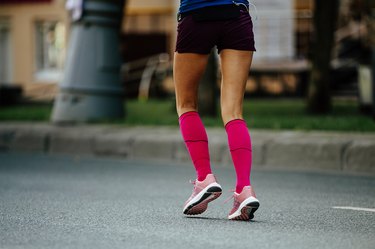
Wearing your compression stockings while exercising is not contraindicated and in some cases, even recommended. The question is whether wearing your compression stockings while exercising is necessary and if they have any positive effects on exercise.
Because the evidence is conflicting, consult your doctor to make a decision based on your unique needs and circumstances.
Video of the Day
Video of the Day
Tip
Compression stockings can be worn during exercise. In some cases, a medical condition might necessitate their use during activities.
Identify Compression Stockings
Compression stockings are therapeutic stockings worn to support the venous and lymphatic systems of the leg. Ambulatory individuals generally use compression stockings called graduated compression stockings.
These stockings are tighter around the ankle and get looser as they go up to below or above the knees, as explained by Mayo Clinic. Individuals may wear compression stockings on both legs or just one, depending on their purpose.
Compression stockings come in various compressions, or pressures. Lighter compressions can be obtained over-the-counter, while greater compressions must be obtained by prescription.
Compression Stockings for Exercise and Other Needs
Compression stockings treat venous disorders, such as chronic venous insufficiency, varicose veins, lymphedema and post phlebetic syndrome. Compression stockings help to circulate the blood back to the heart, decreasing swelling in the legs and preventing blood clots from forming in the legs.
People who have just come out of surgery often wear compression stockings to prevent the formation of blood clots, a common risk after surgery. Because the venous system is under twice its normal stress during pregnancy, pregnant people may benefit from wearing compression stockings, which may alleviate leg discomfort and prevent varicose veins.
Those who spend the majority of the day on their feet may benefit from wearing compression stockings as they are prone to leg swelling and varicose veins. Compression stockings are recommended for travelers because circulation can be compromised from prolonged sitting.
Shop Our Favorite Compression Socks
- Best Overall: Zensah Tech+ Compression Socks (Zensah.com, $50)
- Best Budget: SB SOX Compression Socks (Amazon.com, $13.95-$15.95 for a 3-pack)
- Best for Running: Paplus Ankle Compression Socks (Amazon.com, $11.99-$19.99)
- Best for Post-Workout Recovery: EvoShield Recovery DNA Compression Tights (Amazon.com, $80)
Recognize the Advantages
Some individuals choose to exercise in compression stockings, reporting that they improve performance. According to a March 2015 article published by Journal of Sports Science & Medicine, there are conflicting opinions among researchers about these potential benefits.
The authors also pointed out that while the mechanisms are unclear, wearing compression stockings during exercise appears to reduce delayed-onset muscle soreness and improve exercise recovery.
For people who have varicose veins, the Society for Vascular Nursing recommends wearing compression stockings while exercising as this helps move the increased blood in the legs back to the heart.
Be Aware of Drawbacks
Regardless of their role in exercise, compression stockings take some time to get used to. Users find compression stockings difficult to put on, especially if they're older or have obesity or disabilities.
According to an article published in 2018 in the journal Phlebology, compliance with the use of compression stockings is compromised due to poor fit. Users also report negative side effects such as sweating and itching, which discourage use.
The study reiterates the importance of a proper fit and the need for users to be educated in the purpose and proper use of compression stockings. You should get fitted for your compression stockings by a qualified nurse or pharmacy or medical supply store specialist.
Another drawback of compression stockings is their price. They can be expensive and may or may not be covered by insurance, depending on their purpose.
- Society for Vascular Nursing: "Varicose Veins"
- Phlebology: "Advantages and Disadvantages of Graduated and Inverse Graduated Compression Hosiery in Patients with Chronic Venous Insufficiency and Healthy Volunteers: A Prospective, Mono-Centric, Blinded, Open Randomised, Controlled and Cross-Over Trial"
- Journal of Sports Science & Medicine: "Compression Garments and Exercise: No Influence of Pressure Applied"
- Mayo Clinic: "Mayo Clinic Q and A: Tips for Using Compression Stockings"
Is this an emergency? If you are experiencing serious medical symptoms, please see the National Library of Medicine’s list of signs you need emergency medical attention or call 911.